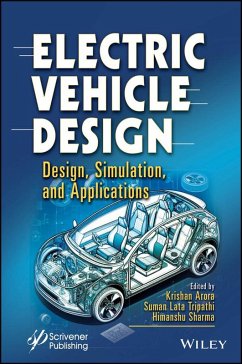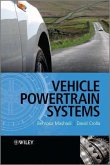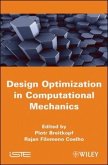Electric Vehicle Design (eBook, PDF)
Design, Simulation, and Applications
Redaktion: Arora, Krishan; Sharma, Himanshu; Tripathi, Suman Lata


Alle Infos zum eBook verschenken

Electric Vehicle Design (eBook, PDF)
Design, Simulation, and Applications
Redaktion: Arora, Krishan; Sharma, Himanshu; Tripathi, Suman Lata
- Format: PDF
- Merkliste
- Auf die Merkliste
- Bewerten Bewerten
- Teilen
- Produkt teilen
- Produkterinnerung
- Produkterinnerung

Hier können Sie sich einloggen

Bitte loggen Sie sich zunächst in Ihr Kundenkonto ein oder registrieren Sie sich bei bücher.de, um das eBook-Abo tolino select nutzen zu können.
ELECTRIC VEHICLE DESIGN This book will serve as a definitive guide to conceptual and practical knowledge about the design of hybrid electrical vehicles (HEV), battery electrical vehicles (BEV), fuel cell electrical vehicles (FCEV), plug-in hybrid electrical vehicles (PHEV), and efficient EV charging techniques with advanced tools and methodologies for students, engineers, and academics alike. This book deals with novel concepts related to fundamentals, design, and applications of conventional automobiles with internal combustion engines (ICEs), electric vehicles (EVs), hybrid electric vehicles…mehr
- Geräte: PC
- mit Kopierschutz
- eBook Hilfe
- Größe: 64.77MB
![Vehicle Powertrain Systems (eBook, PDF) Vehicle Powertrain Systems (eBook, PDF)]() David CrollaVehicle Powertrain Systems (eBook, PDF)87,99 €
David CrollaVehicle Powertrain Systems (eBook, PDF)87,99 €![Yield Design (eBook, PDF) Yield Design (eBook, PDF)]() Jean SalenconYield Design (eBook, PDF)139,99 €
Jean SalenconYield Design (eBook, PDF)139,99 €![Biomimetic Principles and Design of Advanced Engineering Materials (eBook, PDF) Biomimetic Principles and Design of Advanced Engineering Materials (eBook, PDF)]() Zhenhai XiaBiomimetic Principles and Design of Advanced Engineering Materials (eBook, PDF)91,99 €
Zhenhai XiaBiomimetic Principles and Design of Advanced Engineering Materials (eBook, PDF)91,99 €![Multidisciplinary Design Optimization in Computational Mechanics (eBook, PDF) Multidisciplinary Design Optimization in Computational Mechanics (eBook, PDF)]() Multidisciplinary Design Optimization in Computational Mechanics (eBook, PDF)207,99 €
Multidisciplinary Design Optimization in Computational Mechanics (eBook, PDF)207,99 €![Applied Mechanical Design (eBook, PDF) Applied Mechanical Design (eBook, PDF)]() Ammar GrousApplied Mechanical Design (eBook, PDF)144,99 €
Ammar GrousApplied Mechanical Design (eBook, PDF)144,99 €![Bioprocessing Piping and Equipment Design (eBook, PDF) Bioprocessing Piping and Equipment Design (eBook, PDF)]() William M. Huitt (Bill)Bioprocessing Piping and Equipment Design (eBook, PDF)116,99 €
William M. Huitt (Bill)Bioprocessing Piping and Equipment Design (eBook, PDF)116,99 €![Primer on Engineering Standards, Expanded Textbook Edition (eBook, PDF) Primer on Engineering Standards, Expanded Textbook Edition (eBook, PDF)]() Maan H. JawadPrimer on Engineering Standards, Expanded Textbook Edition (eBook, PDF)40,99 €
Maan H. JawadPrimer on Engineering Standards, Expanded Textbook Edition (eBook, PDF)40,99 €-
-
-
Dieser Download kann aus rechtlichen Gründen nur mit Rechnungsadresse in A, B, BG, CY, CZ, D, DK, EW, E, FIN, F, GR, HR, H, IRL, I, LT, L, LR, M, NL, PL, P, R, S, SLO, SK ausgeliefert werden.
- Produktdetails
- Verlag: John Wiley & Sons
- Seitenzahl: 368
- Erscheinungstermin: 2. April 2024
- Englisch
- ISBN-13: 9781394205080
- Artikelnr.: 70314954
- Verlag: John Wiley & Sons
- Seitenzahl: 368
- Erscheinungstermin: 2. April 2024
- Englisch
- ISBN-13: 9781394205080
- Artikelnr.: 70314954
- Herstellerkennzeichnung Die Herstellerinformationen sind derzeit nicht verfügbar.
1 Development of Braking Systems in Fuel Cell Electric Vehicles 1
Harpreet Singh Bedi, Shakti Raj Chopra and Krishan Arora
1.1 Introduction 1
1.2 Historical Background of Fuel Cell 2
1.3 ADVISOR 3
1.4 Why Hydrogen is Preferred 4
1.5 What is a Fuel Cell? 4
1.6 Working of Fuel Cells 4
1.7 Types of Fuel Cells 5
1.8 Block Diagram of Vehicle on MATLAB/Simulink 8
1.9 Braking System in Vehicle 8
1.10 Regenerative Braking System 9
1.11 Anti-Lock Braking System (ABS) 10
1.12 Conclusion 15
2 Design and Applications of Fuel Cells 19
Pradeep Singh, Krishan Arora and Umesh C. Rathore
2.1 Introduction 20
2.2 Types of Electric Vehicles 21
2.3 Design Equations of Fuel Cells 25
2.4 Designing of Fuel Cells 29
2.5 Types of Fuel Cells 30
2.6 Solid Oxide FCs (SOFCs) 31
2.7 Alkaline Fuel Cells (AFCs) 35
2.8 Molten Carbonate Fuel Cell (MCFC) 39
2.9 Phosphoric Acid Fuel Cells (PAFCs) 43
2.10 Polymer Electrolyte Membrane Fuel Cell (PEMFC) 46
2.11 Direct Methanol Fuel Cells (DMFCs) 50
2.12 Parameters Affecting the Performance of FCs 54
3 Smart Energy Management and Monitoring System for Electric Vehicles with
IoT Integration 57
Challa Krishna Rao, Sarat Kumar Sahoo and Franco Fernando Yanine
3.1 Introduction 58
3.2 The Control of Electric Vehicles Using IoT 59
3.3 IoT Management Issues with Electric Vehicles 61
3.4 Monitoring and Management Benefits of IoT 62
3.5 Predictive Maintenance System with Fault Alerts 64
3.6 IoT Management and Monitoring Issues with Electric Vehicles 65
3.7 Microcontroller 68
3.8 IoT-Based Systems for Battery Management and Monitoring 71
3.9 Design of Battery Charge Control and Monitoring System 71
3.10 Results and Discussion 73
3.11 Conclusions 74
3.12 Future Scope of IoT in Electric Vehicles 75
4 A Review of Electric Vehicles: Technologies and Challenges 81
N. Suthanthira Vanitha, L. Manivannan, K. Radhika, A. Karthikeyan and T.
Meenakshi
4.1 Introduction 82
4.2 Electric Motors 82
4.3 Power Electronic Converters 87
4.4 Battery in Electric Vehicles 92
4.5 Conclusion 97
5 Electric Vehicle and Design Using MATLAB 101
Vinay Anand and Himanshu Sharma
5.1 Introduction 102
5.2 Motivation 103
5.3 Basic Fundamentals of EVs 104
5.4 Why Electric Vehicles? 106
5.5 Comparison Between ICV and EV 106
5.6 Classification of EVs 107
5.7 Design and Structure of EV 108
5.8 Mathematical Model of an Electric Vehicle 115
5.9 Control Strategy of EVs 116
5.10 Design Methodology for Electric Vehicles (EVs) 117
5.11 Latest Emerging Technology in EV 118
5.12 Performance Valuation of BLDC Motor and Induction Motor for Electric
Vehicle Propulsion Application 119
5.13 Conclusion 125
6 Model Order Reduction of Battery for Smart Battery Management System 129
Dheeraj Kumar Dhaked, Aswant Kumar Sharma, Dhanesh Kumar Sambariya and
Dinesh Birla
6.1 Introduction 129
6.2 Problem Formulation 131
6.3 Modeling of Battery 132
6.4 Methodology for Model Order Reduction 134
6.5 Result and Discussion 137
6.6 Conclusion 141
7 Power Electronic Converters for Electric Vehicle Application 147
P. Swati Patro, Sarat Kumar Sahoo and Fernando Yanine
7.1 Introduction 148
7.2 Types of Electrical Vehicle and Role of Power Electronic Converter 151
7.3 Recent Development in Power Electronic Converter 158
7.4 Power Electronic Converters in Electric, Hybrid, and Fuel Cell Vehicles
161
7.5 Challenges in Power Electronic Vehicular System 162
7.6 Conclusion 164
8 Integrating Electric Vehicles Into Smart Grids Through Data Analytics:
Challenges and Opportunities 167
Vikram Kulkarni, Sarat Kumar Sahoo, Ketan Shah and Prapita Thanarak
8.1 Introduction 168
8.2 Smart Grid and Electric Vehicle 169
8.3 Impact of Electric Vehicle--Based Data Analytics for Smart Grids 169
8.4 Importance of Resource Availability, Price, and Load for EV 171
8.5 Electric-Tariff Design Based on Impact of Electric Vehicle Usage 173
8.6 Data Analytics for Electric Vehicles 174
8.7 Machine Learning for EV Analytics 176
8.8 What are the Different ML Algorithms Used by Authors for EV Analytics?
177
8.9 Importance of Data Analysis in the EV Industry Using an Open Source
Data 178
8.10 Description of the Dataset 179
8.11 Features and Factors That Influence the Prices of EVs 179
8.12 Price Prediction of EVs 180
8.13 Random Forest--Based Price Prediction of Electric Vehicles 185
8.14 Machine Learning Model 187
8.15 Electric Vehicle Usage in India 189
8.16 The Challenges of Adopting EV in India 190
8.17 How to Increase Renewable Energy in India to Meet EV Demand 191
9 Hybrid Electrical Vehicle Designs 197
T. Meenakshi, K. Mahendran, N. Suthanthira Vanitha and C. Shanmugam
9.1 Introduction 197
9.2 Plug-In Hybrid Electric Vehicles 198
9.3 Classification of HEVs 199
9.4 Fuel Cell Electric Vehicles (FCEVs) 201
9.5 Hybrid Electric Vehicle System Design and Analysis 203
9.6 Control Strategy in Series Hybrid Drivetrain Configuration 204
9.7 Design of Fuel Cell Electric Vehicles with Fuel Economy 209
9.8 Conclusion 213
10 EV Battery Charging System 215
Balamurugan M., Narendiran S., Sarat Kumar Sahoo and Fernando Yanine
10.1 Introduction 216
10.2 Electric Vehicle Charging Infrastructure 217
10.3 Power Electronics Converters Used for Charging System 219
10.4 Control Strategies of EV Charging System 221
10.5 Various Modes of Charging System 226
10.6 Real-Time Challenges of EV Charging Infrastructure 227
11 Optimization Algorithms and Computing Techniques for Electric Vehicles:
Advancements in Computing and Algorithms 235
S. Arun Mozhi, J. Nishanthy, S. Charles Raja and J. Jeslin Drusila
Nesamalar
11.1 Introduction 236
11.2 Fundamental Optimization Techniques 238
11.3 Problem Formulation of Optimal Solution 238
11.4 Optimization Techniques 241
11.5 Electric Vehicle 244
11.6 Challenges in EV Implementation 250
11.7 Optimization Techniques for Electric Vehicles 252
11.8 Conclusion 261
12 Economic Load Dispatch Solutions at Small, Medium, and Large Scales
Utilizing Chaotic Spotted Hyena Optimization 265
Tanuj Mishra, Amit Kumar Singh and Vikram Kumar Kamboj
12.1 Introduction 266
12.2 Unit Commitment and Economic Dispatch Process 267
12.3 Optimization in Power System 268
12.4 Hybrid Optimization Algorithm 273
12.5 Chaotic Spotted Hyena Optimization Technique 274
12.6 Economic Load Dispatch Problem 276
12.7 Power Balance Equality Constraints 277
12.8 Generator Power Limit Inequality Constraints 278
12.9 Test Systems Results and Discussion 278
12.10 Conclusion 288
13 Simulation of Automatic Search of Charging Station for Electric Bikes
295
Saroja S., Haseena S., Hariharan M. and Raghul Priyadharshan M.
13.1 Introduction 296
13.2 Related Works 298
13.3 Methodology 299
13.4 Load Balancing of Smart Grid 303
13.5 Electric Bike Supply Equipment (EBSE) Algorithm 304
13.6 Simulation 305
13.7 Performance Metrics 307
13.8 Method and Existing Method 308
14 Self-Charging Electrical Vehicle Design and Analysis with MATLAB 313
Ramchandra Sahani, Ishak Jamatia, Manas Daga, Pavan Kumar and Suman Lata
Tripathi
14.1 Introduction 313
14.2 Natural Energy Sources for Self-Charging Electrical Vehicles 314
14.2.1 Wind Energy 315
14.3 Arduino-Based Control Systems in Electric Vehicles 323
14.4 MATLAB-Based Simulation and Modeling for Self-Charging Electric
Vehicles 325
14.5 Electric Motor Model 327
14.6 Results for Vehicle Performance 329
14.7 Power Electronics Model 330
14.8 Energy Management System 330
14.9 Conclusion 333
References 333
Index 335
1 Development of Braking Systems in Fuel Cell Electric Vehicles 1
Harpreet Singh Bedi, Shakti Raj Chopra and Krishan Arora
1.1 Introduction 1
1.2 Historical Background of Fuel Cell 2
1.3 ADVISOR 3
1.4 Why Hydrogen is Preferred 4
1.5 What is a Fuel Cell? 4
1.6 Working of Fuel Cells 4
1.7 Types of Fuel Cells 5
1.8 Block Diagram of Vehicle on MATLAB/Simulink 8
1.9 Braking System in Vehicle 8
1.10 Regenerative Braking System 9
1.11 Anti-Lock Braking System (ABS) 10
1.12 Conclusion 15
2 Design and Applications of Fuel Cells 19
Pradeep Singh, Krishan Arora and Umesh C. Rathore
2.1 Introduction 20
2.2 Types of Electric Vehicles 21
2.3 Design Equations of Fuel Cells 25
2.4 Designing of Fuel Cells 29
2.5 Types of Fuel Cells 30
2.6 Solid Oxide FCs (SOFCs) 31
2.7 Alkaline Fuel Cells (AFCs) 35
2.8 Molten Carbonate Fuel Cell (MCFC) 39
2.9 Phosphoric Acid Fuel Cells (PAFCs) 43
2.10 Polymer Electrolyte Membrane Fuel Cell (PEMFC) 46
2.11 Direct Methanol Fuel Cells (DMFCs) 50
2.12 Parameters Affecting the Performance of FCs 54
3 Smart Energy Management and Monitoring System for Electric Vehicles with
IoT Integration 57
Challa Krishna Rao, Sarat Kumar Sahoo and Franco Fernando Yanine
3.1 Introduction 58
3.2 The Control of Electric Vehicles Using IoT 59
3.3 IoT Management Issues with Electric Vehicles 61
3.4 Monitoring and Management Benefits of IoT 62
3.5 Predictive Maintenance System with Fault Alerts 64
3.6 IoT Management and Monitoring Issues with Electric Vehicles 65
3.7 Microcontroller 68
3.8 IoT-Based Systems for Battery Management and Monitoring 71
3.9 Design of Battery Charge Control and Monitoring System 71
3.10 Results and Discussion 73
3.11 Conclusions 74
3.12 Future Scope of IoT in Electric Vehicles 75
4 A Review of Electric Vehicles: Technologies and Challenges 81
N. Suthanthira Vanitha, L. Manivannan, K. Radhika, A. Karthikeyan and T.
Meenakshi
4.1 Introduction 82
4.2 Electric Motors 82
4.3 Power Electronic Converters 87
4.4 Battery in Electric Vehicles 92
4.5 Conclusion 97
5 Electric Vehicle and Design Using MATLAB 101
Vinay Anand and Himanshu Sharma
5.1 Introduction 102
5.2 Motivation 103
5.3 Basic Fundamentals of EVs 104
5.4 Why Electric Vehicles? 106
5.5 Comparison Between ICV and EV 106
5.6 Classification of EVs 107
5.7 Design and Structure of EV 108
5.8 Mathematical Model of an Electric Vehicle 115
5.9 Control Strategy of EVs 116
5.10 Design Methodology for Electric Vehicles (EVs) 117
5.11 Latest Emerging Technology in EV 118
5.12 Performance Valuation of BLDC Motor and Induction Motor for Electric
Vehicle Propulsion Application 119
5.13 Conclusion 125
6 Model Order Reduction of Battery for Smart Battery Management System 129
Dheeraj Kumar Dhaked, Aswant Kumar Sharma, Dhanesh Kumar Sambariya and
Dinesh Birla
6.1 Introduction 129
6.2 Problem Formulation 131
6.3 Modeling of Battery 132
6.4 Methodology for Model Order Reduction 134
6.5 Result and Discussion 137
6.6 Conclusion 141
7 Power Electronic Converters for Electric Vehicle Application 147
P. Swati Patro, Sarat Kumar Sahoo and Fernando Yanine
7.1 Introduction 148
7.2 Types of Electrical Vehicle and Role of Power Electronic Converter 151
7.3 Recent Development in Power Electronic Converter 158
7.4 Power Electronic Converters in Electric, Hybrid, and Fuel Cell Vehicles
161
7.5 Challenges in Power Electronic Vehicular System 162
7.6 Conclusion 164
8 Integrating Electric Vehicles Into Smart Grids Through Data Analytics:
Challenges and Opportunities 167
Vikram Kulkarni, Sarat Kumar Sahoo, Ketan Shah and Prapita Thanarak
8.1 Introduction 168
8.2 Smart Grid and Electric Vehicle 169
8.3 Impact of Electric Vehicle--Based Data Analytics for Smart Grids 169
8.4 Importance of Resource Availability, Price, and Load for EV 171
8.5 Electric-Tariff Design Based on Impact of Electric Vehicle Usage 173
8.6 Data Analytics for Electric Vehicles 174
8.7 Machine Learning for EV Analytics 176
8.8 What are the Different ML Algorithms Used by Authors for EV Analytics?
177
8.9 Importance of Data Analysis in the EV Industry Using an Open Source
Data 178
8.10 Description of the Dataset 179
8.11 Features and Factors That Influence the Prices of EVs 179
8.12 Price Prediction of EVs 180
8.13 Random Forest--Based Price Prediction of Electric Vehicles 185
8.14 Machine Learning Model 187
8.15 Electric Vehicle Usage in India 189
8.16 The Challenges of Adopting EV in India 190
8.17 How to Increase Renewable Energy in India to Meet EV Demand 191
9 Hybrid Electrical Vehicle Designs 197
T. Meenakshi, K. Mahendran, N. Suthanthira Vanitha and C. Shanmugam
9.1 Introduction 197
9.2 Plug-In Hybrid Electric Vehicles 198
9.3 Classification of HEVs 199
9.4 Fuel Cell Electric Vehicles (FCEVs) 201
9.5 Hybrid Electric Vehicle System Design and Analysis 203
9.6 Control Strategy in Series Hybrid Drivetrain Configuration 204
9.7 Design of Fuel Cell Electric Vehicles with Fuel Economy 209
9.8 Conclusion 213
10 EV Battery Charging System 215
Balamurugan M., Narendiran S., Sarat Kumar Sahoo and Fernando Yanine
10.1 Introduction 216
10.2 Electric Vehicle Charging Infrastructure 217
10.3 Power Electronics Converters Used for Charging System 219
10.4 Control Strategies of EV Charging System 221
10.5 Various Modes of Charging System 226
10.6 Real-Time Challenges of EV Charging Infrastructure 227
11 Optimization Algorithms and Computing Techniques for Electric Vehicles:
Advancements in Computing and Algorithms 235
S. Arun Mozhi, J. Nishanthy, S. Charles Raja and J. Jeslin Drusila
Nesamalar
11.1 Introduction 236
11.2 Fundamental Optimization Techniques 238
11.3 Problem Formulation of Optimal Solution 238
11.4 Optimization Techniques 241
11.5 Electric Vehicle 244
11.6 Challenges in EV Implementation 250
11.7 Optimization Techniques for Electric Vehicles 252
11.8 Conclusion 261
12 Economic Load Dispatch Solutions at Small, Medium, and Large Scales
Utilizing Chaotic Spotted Hyena Optimization 265
Tanuj Mishra, Amit Kumar Singh and Vikram Kumar Kamboj
12.1 Introduction 266
12.2 Unit Commitment and Economic Dispatch Process 267
12.3 Optimization in Power System 268
12.4 Hybrid Optimization Algorithm 273
12.5 Chaotic Spotted Hyena Optimization Technique 274
12.6 Economic Load Dispatch Problem 276
12.7 Power Balance Equality Constraints 277
12.8 Generator Power Limit Inequality Constraints 278
12.9 Test Systems Results and Discussion 278
12.10 Conclusion 288
13 Simulation of Automatic Search of Charging Station for Electric Bikes
295
Saroja S., Haseena S., Hariharan M. and Raghul Priyadharshan M.
13.1 Introduction 296
13.2 Related Works 298
13.3 Methodology 299
13.4 Load Balancing of Smart Grid 303
13.5 Electric Bike Supply Equipment (EBSE) Algorithm 304
13.6 Simulation 305
13.7 Performance Metrics 307
13.8 Method and Existing Method 308
14 Self-Charging Electrical Vehicle Design and Analysis with MATLAB 313
Ramchandra Sahani, Ishak Jamatia, Manas Daga, Pavan Kumar and Suman Lata
Tripathi
14.1 Introduction 313
14.2 Natural Energy Sources for Self-Charging Electrical Vehicles 314
14.2.1 Wind Energy 315
14.3 Arduino-Based Control Systems in Electric Vehicles 323
14.4 MATLAB-Based Simulation and Modeling for Self-Charging Electric
Vehicles 325
14.5 Electric Motor Model 327
14.6 Results for Vehicle Performance 329
14.7 Power Electronics Model 330
14.8 Energy Management System 330
14.9 Conclusion 333
References 333
Index 335







